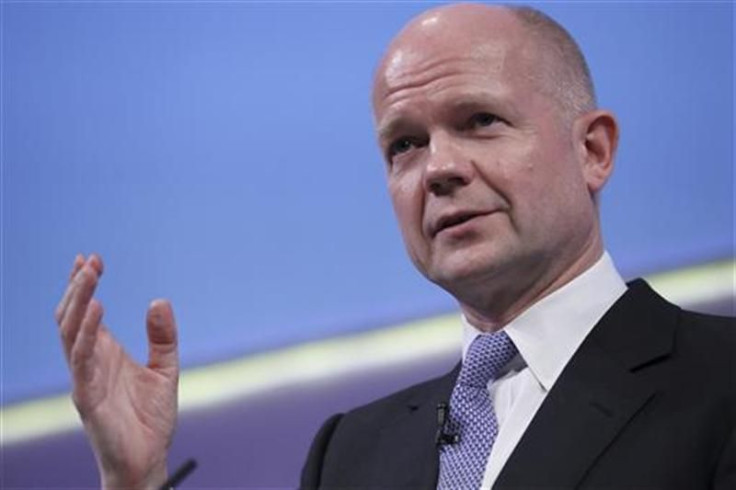Iran’s Nuclear Program Could Provoke New 'Cold War:' Hague

Iran’s plan to develop atomic weapons could ignite a nuclear “Cold War,” warned the British Foreign Secretary.
In an unusually frank interview with the Daily Telegraph newspaper, William Hague said such a new type of global conflicts would be deadlier than the previous Cold War between the United States/Western Europe and Soviet Union.
Iran’s aggressive nuclear ambitions is a “crisis coming down the tracks” which may lead to another war in the Middle East, Hague said, one that could encompass countries all around the globe, given the crucial importance of the oil trade in the Persian Gulf.
“[Iran] is clearly continuing their nuclear weapons program,” Hague said. “If they obtain nuclear weapons capability, then I think other nations across the Middle East will want to develop nuclear weapons.”
Hague added: “The most serious round of nuclear proliferation since nuclear weapons were invented would have begun with all the destabilizing effects in the Middle East. And the threat of a new cold war in the Middle East without necessarily all the safety mechanisms … That would be a disaster in world affairs.”
Western nations are increasingly concerned that Israel may soon launch missile strikes on Iran to destroy its nuclear projects. Hague asserted that “all options must remain on the table” with respect to dealing with the Tehran regime, mirroring the United States contention that an armed conflict with the Iranians may be unavoidable.
However, Hague claimed that London has urged the Israelis not to launch such a strike.
“We are very clear to all concerned that we are not advocating military action,” he said. “We support a twin-track strategy of sanctions and pressure and negotiations on the other hand. We are not favoring the idea of anybody attacking Iran at the moment.”
Noting that the United Kingdom could be within reach of Iranian nuclear weapons, Hague said Britain has “to be concerned.” Peter Biles, a BBC correspondent, commented: “Hague has spelled out what Iran-watchers have long feared. Namely, that there could be a Middle East arms race if Iran acquires a nuclear weapon. Saudi Arabia, Egypt and Turkey would certainly be among those most concerned by Iran getting a bomb.”
Biles added: “It's clear from… Hague's comments that Britain wants to continue to pursue a twin-track approach towards Iran -- maintaining the economic pressure, through sanctions, while also keeping open the door to negotiations.” Some observers feel that fears of a nuclear Iran may be exaggerated.
Shashank Joshi, of defense think tank the Royal United Services Institute, told BBC: If we could live with nuclear weapons in the hands of totalitarian, genocidal states like Stalin's Russia or Mao's China, Iran in contrast -- whatever its repulsive internal policies and adventurism abroad -- is far more rational.”
Sir Richard Dalton, a retired British diplomat, also is not convinced that Iran is pursuing nuclear weapons development. Analysis published to the United States Congress by the top intelligence assessors there indicates that Iran has not taken a decision to have a nuclear weapon,” he told BBC.
But it is right that the [International Atomic Energy Agency] should press Iran on behalf of the international community to answer fully questions about what it has been up to in the past and what it may still be doing in the present.
Separately, Hague stated that the British government is in no way conspiring with Israel to kill Iranian nuclear scientists (four of which have been murdered in mysterious circumstances around the Teheran area in recent years). The Iranian regime explicitly accused Mossad, Israel’s secret agency, of perpetrating the killings. Israel has neither confirmed nor denied the allegations, but the Jewish State has in turn accused Iran of staging attacks on Israeli diplomats in India, Thailand and Georgia in recent days.
“It is not our way of dealing with this to have assassinations or to advocate military action,” Hague said. “Although I do stress again, we are taking nothing off the table.”
Iran has long insisted that its nuclear program is designed for “peaceful” purposes and that western sanctions against the nation’s oil economy will not deter it from pursuing atomic energy.
© Copyright IBTimes 2024. All rights reserved.





















